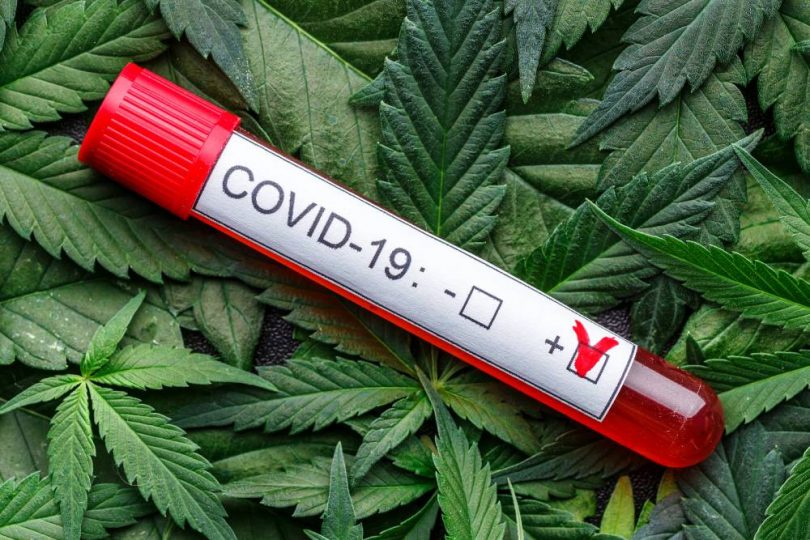The severe acute respiratory syndrome coronavirus-2 (SARS-CoV-2), responsible for the global COVID-19 pandemic, enters human cells through interaction with the host cell surface receptor ACE2. [1] This RNA coronavirus features proteins on the surface, called spike glycoproteins, which help the coronavirus enter into our cells by interacting with the ACE2 surface receptor through receptor binding domains (RBD) of the spike proteins.
The spike proteins are activated by human proteases (enzymes that break down proteins) and, once fused with the cell membrane, the virus releases its genetic material infecting the cell. [2] Even if vaccines have been developed, there is an high rate of virus mutation which hinder the efficacy against the infection. Among the most well known SARS-CoV-2 variants there are B.1.1.7, B.1.351, and B.1.617.2 first detected in the United Kingdom, South Africa, and India, respectively.
The discovery of new methods to reduce COVID-19 spread is at the heart of the efforts of many research groups and it has been a focal point of scientific studies since the beginning of the pandemic. Molecules capable of inhibiting the virus from entering cells have been tested to prevent COVID-19 infections. These ligands are capable of binding with high affinity to the virus RBD, hindering or blocking the virus-receptor interaction.
Attempts to find natural molecules with these inhibitory properties have led researchers to hemp extracts, which have been recently tested using magnetic microbead affinity selection screening (MagMASS). [1] Once the virus spike proteins have been immobilized on magnetic beads and incubated with the botanical extract, the complexed ligand-receptors are separated from the unbound low affinity molecules.
Among the components of the cannabis extracts, cannabidiolic acid (CBDA) and cannabigerolic acid (CBGA) showed the highest binding affinity to the virus spike proteins with the lowest associated dissociation constant (meaning they stayed bound). The infection of human epithelial cells by a live pseudovirus expressing SARS-CoV-2 was prevented by these acidic cannabinoids and this inhibitory action was equally effective also for the variants B.1.1.7 and B.1.351.
Even though tetrahydrocannabinolic acid (THCA) was screened through computer modelling as a promising ligand for coronavirus RBD, because of its low availability as a restricted substance, it was not possible to measure its dissociation constant or antiviral capability. Other cannabinoids, including Δ9-tetrahydrocannabinol, Δ8-tetrahydrocannabinol, cannabichromene, cannabigerol, cannabinol, and cannabidiol (CBD) demonstrated weak or no binding. That’s not at all to say, however, that these other cannabinoids have no efficacy against coronaviruses, as CBD has shown promise for inhibiting the virus from replicating. [3]
MagMASS analysis also suggested that CBGA interacts with chemical residues at the allosteric binding site (not the primary binding site) of the RBD virus without competing with cannabinoid ligands acting at the primary, or orthosteric binding site. The believed action of CBGA at the allosteric RBD could be a potential benefit to reduce the incurrence of resistant SARS-CoV-2 strains and virus evolutionary mutations, which are often localized at the primary binding site that is the preferred target for neutralizing antibodies. [1] These important findings highlight the potential of the natural acidic cannabinoids CBDA and CBGA in the fight against coronavirus, both as a preventive measure or a therapeutic treatment. It’s very interesting that this ancient plant offers phytochemicals that are useful in combating a pandemic that the world has never seen before.
References:
[1] van Breemen RB, Muchiri RN, Bates TA, et al. Cannabinoids block cellular entry of SARS-CoV-2 and the emerging variants. J Nat Prod. 2022;85(1):176-184. doi: 10.1021/acs.jnatprod.1c00946 [journal impact factor = 4.050; times cited = 12][2] Shang J, Wan Y, Luo C, et al. Cell entry mechanisms of SARS-CoV-2. Proc Natl Acad Sci U S A. 2020;117(21):11727-11734. doi:10.1073/pnas.2003138117 [journal impact factor = 11.205; times cited = 1769]
[3] Nguyen LC, Yang D, Nicolaescu V, et al. Cannabidiol inhibits SARS-CoV-2 replication through induction of the host ER stress and innate immune responses. Sci Adv. 2022;8(8):eabi6110. [journal impact factor = 14.14; times cited = 10]
Image: https://www.bigstockphoto.com/it/image-403152818/stock-photo-covid-19-coronavirus%2C-infected-blood-sample-in-the-sample-tube%2Cassorted-cannabis-products%2C-pills-and








